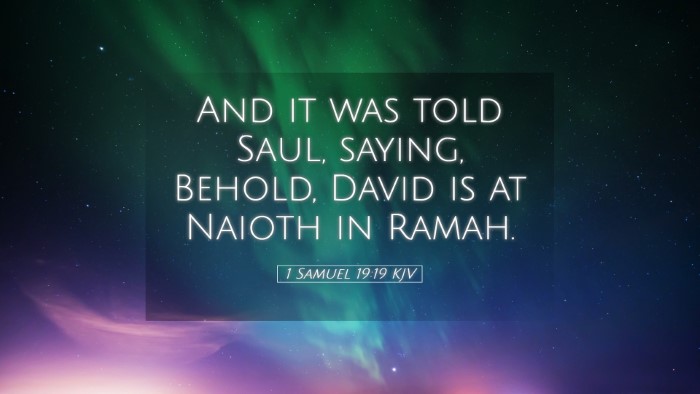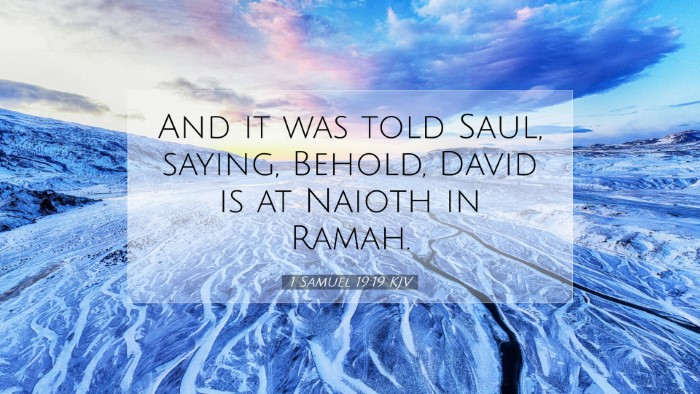Commentary on 1 Samuel 19:19
Bible Verse: 1 Samuel 19:19 - "And it was told Saul, saying, Behold, David is at Naioth in Ramah."
Introduction
This passage occurs during a tumultuous period in Israel's history, where King Saul is increasingly tormented by jealousy and fear of David, who has been anointed by God as his successor. The message delivered to Saul reflects the danger that David faces and the perilous nature of his growing popularity and favor with both the people and God.
Context and Background
The narrative of 1 Samuel 19 sits at a critical juncture in the story of David and Saul. After David's successful battles and growing acclaim, Saul's mental state deteriorates, leading him to seek David's life. This chapter reveals both Saul's descending madness and David's emerging leadership among the people of Israel.
Public Domain Commentary Insights
Matthew Henry’s Commentary
Henry emphasizes the gravity of the report brought to Saul, showcasing the perennial conflict between Saul and David. He notes that Saul’s relentless pursuit of David stems from his own insecurity and fear of losing his kingdom. This conflict ultimately symbolizes the battle between the flesh (Saul) and the spirit (David).
Henry further points out that the name Naioth signifies "habitations" or "dwellings," implying that David’s refuge among the prophets in Naioth reflects a community oriented towards God’s service. This highlights the paradox: while David is on the run, he is in the company of those whose lives are committed to God.
Albert Barnes’ Notes
Barnes notes the significance of the phrase "it was told Saul," illustrating how knowledge and information play critical roles in escalating conflict. This shows how unchecked ambition and paranoia in leadership can lead to destructive consequences.
He elaborates on the geographical and spiritual context of Naioth in Ramah. The presence of prophets in Naioth underlines God’s protection over David, suggesting that while Saul seeks David with malice, divine providence intervenes to safeguard His anointed one.
Adam Clarke’s Commentary
Clarke explores the implications of David hiding among prophets, signifying not only safety but spiritual companionship. He argues that this choice reflects David’s dependence on God and his desire for guidance among the faithful instead of seeking refuge in the political machinations of Saul's court.
He also sheds light on Saul’s continued obsession with David, emphasizing that it manifests the destructive nature of envy. Clarke notes that Saul's anger and madness serve to reaffirm David's position as God’s chosen leader.
Theological Implications
- Divine Providence: The narrative emphasizes God’s control over the events that transpire. Saul, despite his royal power, cannot touch the Lord's anointed. This reflects the theme of God’s sovereign choice and protection.
- Human Sinfulness: Saul's actions mirror the destructive nature of jealousy and pride. His descent into madness demonstrates how sin can corrupt judgment and lead to heinous consequences.
- Community and Support: David’s refuge among the prophets highlights the necessity of support systems within the faithful community. It encourages believers to seek out companionship and guidance in times of peril.
Practical Applications for Ministry
For pastors and theologians, this passage serves as a reminder of the importance of community and divine guidance in ministry. The contrasts between Saul and David present lessons on leadership, accountability, and the dangers of envy and sin.
- Leadership and Accountability: Church leaders must remain aware of the perils of jealousy and infighting. Humility and spiritual integrity should be prioritized above ambition.
- Faith-Based Communities: Encouraging congregations to foster environments of support and mutual edification can help individuals thrive, especially in challenging seasons.
- Trust in God’s Sovereignty: In times of uncertainty, it is crucial for leaders to remember that God is ultimately in control. Trust in Him can provide solace and strength amidst trials.
Conclusion
1 Samuel 19:19 encapsulates a pivotal moment in the story of David and Saul, highlighting the contrast between divine favor and human folly. This passage invites deep reflection on leadership, community, and the pervasive nature of jealousy. As we meditate on these insights, may we strive to embody the virtues of humility, dependence on God, and supportive fellowship in our own contexts of ministry.


